Space
Space, also known as outer space, refers to the vast expanse that exists beyond Earth's atmosphere. It is a virtually limitless area that contains stars, planets, moons, asteroids, comets, and various forms of interstellar matter. The study of space, also known as astronomy, has fascinated humans for centuries and continues to be a subject of great scientific interest and exploration.
Key Concepts:
- The Universe: Space is home to the universe, which includes all matter, energy, and the physical laws that govern them. The universe is incredibly vast and contains billions of galaxies, each with billions of stars.
- Solar System: Our solar system is a small part of space, consisting of the Sun, eight planets, their moons, and other objects such as asteroids and comets.
- Galaxies: These are massive systems of stars, stellar remnants, interstellar gas, dust, dark matter, and other astronomical objects, bound together by gravity.
- Black Holes: These are regions of space where the gravitational pull is so strong that nothing, not even light, can escape from them.
- Space Exploration: Humans have sent spacecraft and telescopes into space to study and explore its many mysteries, leading to important discoveries and advancements in our understanding of the cosmos.
Study Guide:
To better understand the topic of space, consider exploring the following areas:
- Learn about the formation of the universe and the Big Bang theory.
- Study the planets in our solar system, their characteristics, and their moons.
- Explore the concept of galaxies, their types, and how they are classified.
- Investigate the role of telescopes and other instruments in observing and studying space from Earth.
- Research famous space missions and the contributions they have made to our understanding of space.
By delving into these areas, you can gain a deeper appreciation for the vastness and complexity of space and the ongoing quest to unravel its mysteries.
[Space] Related Worksheets and Study Guides:
.◂Science Worksheets and Study Guides Fourth Grade. Invertebrates - Animals without Backbones
Study Guide Invertebrates - Animals without Backbones
Invertebrates - Animals without Backbones  Activity Lesson
Activity Lesson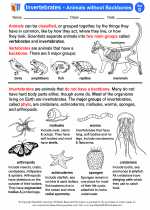 Invertebrates - Animals without Backbones
Invertebrates - Animals without Backbones  Worksheet/Answer key
Worksheet/Answer key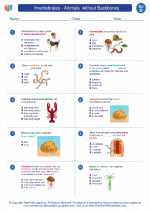 Invertebrates - Animals without Backbones
Invertebrates - Animals without Backbones  Worksheet/Answer key
Worksheet/Answer key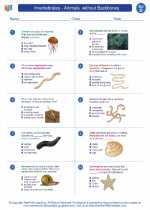 Invertebrates - Animals without Backbones
Invertebrates - Animals without Backbones  Worksheet/Answer key
Worksheet/Answer key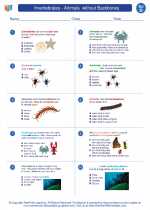 Invertebrates - Animals without Backbones
Invertebrates - Animals without Backbones  Worksheet/Answer key
Worksheet/Answer key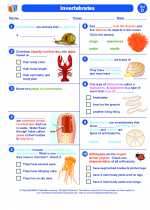 Invertebrates
Invertebrates  Vocabulary/Answer key
Vocabulary/Answer key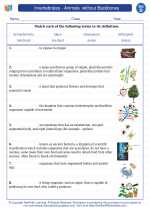 Invertebrates - Animals without Backbones
Invertebrates - Animals without Backbones  Vocabulary/Answer key
Vocabulary/Answer key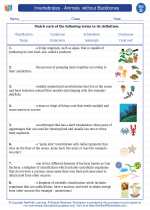 Invertebrates - Animals without Backbones
Invertebrates - Animals without Backbones  Vocabulary/Answer key
Vocabulary/Answer key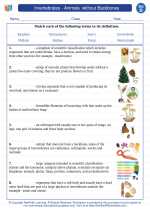 Invertebrates - Animals without Backbones
Invertebrates - Animals without Backbones  Vocabulary/Answer key
Vocabulary/Answer key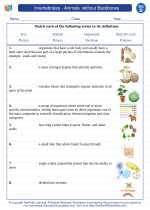 Invertebrates - Animals without Backbones
Invertebrates - Animals without Backbones  Vocabulary/Answer key
Vocabulary/Answer key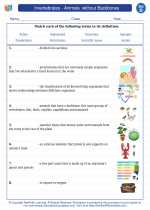 Invertebrates - Animals without Backbones
Invertebrates - Animals without Backbones 

 Activity Lesson
Activity Lesson
 Worksheet/Answer key
Worksheet/Answer key
 Worksheet/Answer key
Worksheet/Answer key
 Worksheet/Answer key
Worksheet/Answer key
 Worksheet/Answer key
Worksheet/Answer key
 Vocabulary/Answer key
Vocabulary/Answer key
 Vocabulary/Answer key
Vocabulary/Answer key
 Vocabulary/Answer key
Vocabulary/Answer key
 Vocabulary/Answer key
Vocabulary/Answer key
 Vocabulary/Answer key
Vocabulary/Answer key

The resources above cover the following skills:
Life Science: The students will use scientific skills and processes to explain the dynamic nature of living things, their interactions, and the results from the interactions that occur over time.
Diversity of Life: Explain how animals and plants can be grouped according to observable features.
Classify a variety of animals and plants according to their observable features and provide reasons for placing them into different groups.